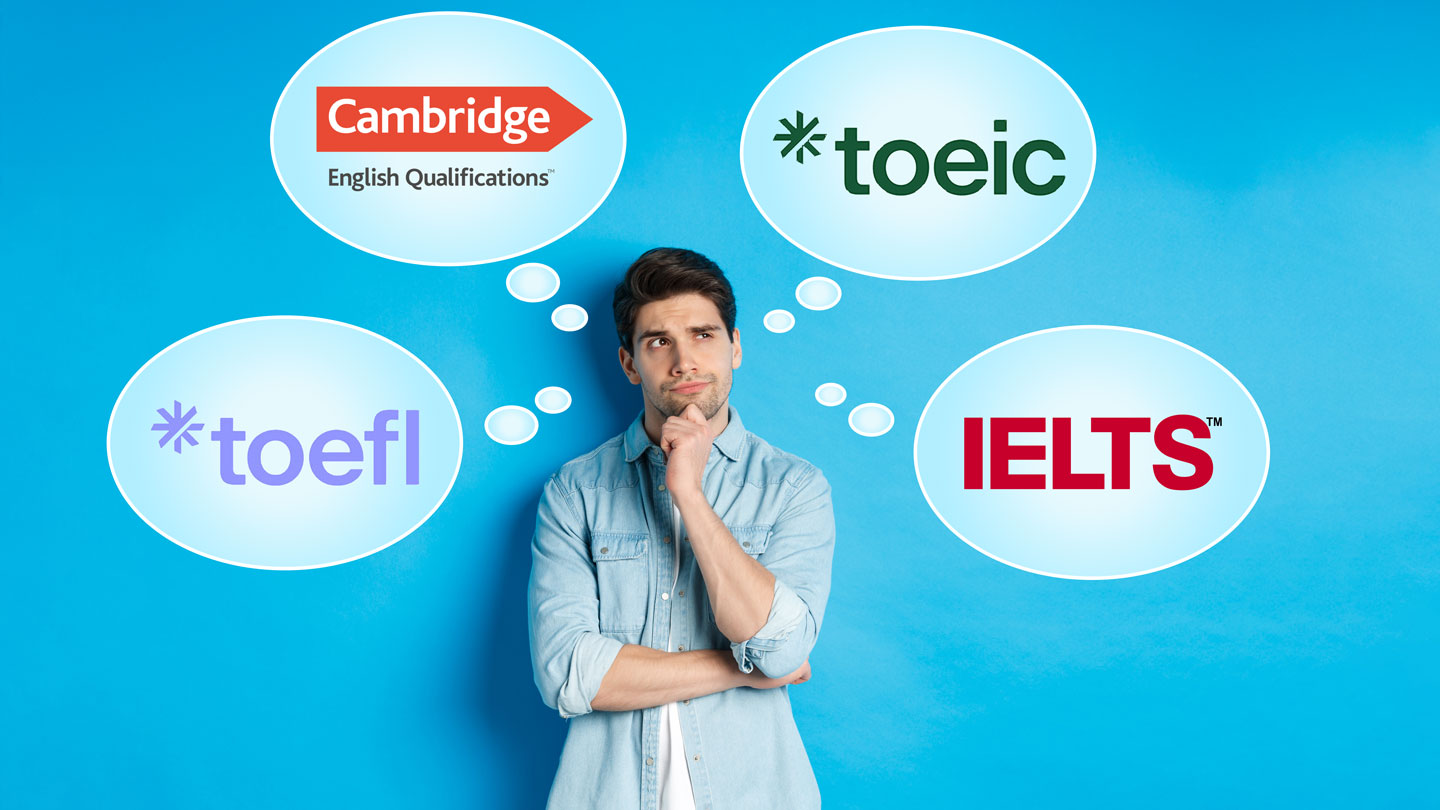If you’ve ever Googled “English certificate for work” or “best English exam for studying abroad,” you’re not alone. We get this question from students all the time.
There are a lot of English exams out there—IELTS, TOEFL, TOEIC, Cambridge—and although they all assess your language skills, they’re not interchangeable. Each one is designed with a specific purpose in mind, and choosing the right one can save you time, money, and a lot of stress.
This guide will walk you through the most popular options and help you figure out which one fits your goals.
What are the most popular English proficiency exams?
The four most commonly taken English exams are:
- IELTS (International English Language Testing System)
- TOEFL (Test of English as a Foreign Language)
- TOEIC (Test of English for International Communication)
- Cambridge English Qualifications (like B2 First or C1 Advanced)
These tests are accepted all over the world but differ in terms of structure, recognition, and difficulty. Your choice should depend on your personal objectives—whether you’re applying to university, looking to boost your CV, or planning to move abroad.
Who should take IELTS, TOEFL, TOEIC or Cambridge?
- IELTS is often required for immigration or university applications in the UK, Australia, and Canada.
- TOEFL is commonly accepted by universities in the United States and increasingly in Europe and Asia.
- TOEIC is used in corporate environments and is ideal if you need to demonstrate English skills for work.
- Cambridge exams offer a broad range of levels and are widely recognised across Europe. Unlike most tests, their certificates never expire.
Your choice depends on where you want to go, what you want to do, and how you like to learn.
TOEFL vs IELTS: key differences in format and focus
Both IELTS and TOEFL test your reading, writing, listening, and speaking skills, but the experience feels different.
TOEFL is computer-based, including the speaking section, which you record into a microphone. IELTS, on the other hand, has a face-to-face speaking component. Some students find this more natural; others find it intimidating.
TOEFL tends to use American English, while IELTS includes a mix of accents. IELTS also gives you the option to take the exam on paper or on a computer, depending on your location.
Cambridge vs TOEIC: which is easier and why?
TOEIC is considered more accessible if your goal is to show language ability in a business context. It focuses on workplace vocabulary and doesn’t usually include a speaking or writing section, unless you take the optional modules.
Cambridge exams are more demanding. They require a broader understanding of grammar, vocabulary, and functional language. They’re a better option if you’re looking for a long-term qualification that’s widely respected in both academic and professional settings.
What English level do you need for each exam?
Each exam aligns with the Common European Framework of Reference (CEFR). For example:
- IELTS and TOEFL are suitable from B1 upwards, depending on the score you need.
- TOEIC is often used to assess levels from A2 to B2.
- Cambridge exams are available at each CEFR level (A2, B1, B2, C1, C2), so you can choose the one that matches your current skills.
If you’re unsure of your level, try our free English level test before choosing your exam — it only takes 10 minutes. Not sure where to begin? You can also check out our guide on how to start learning English from scratch for step-by-step support.
How long does it take to prepare for each test?
It depends on your current level and how much time you can realistically dedicate each week. In general:
- IELTS or TOEFL: You might need 1–3 months of preparation if you’re already at an intermediate level.
- TOEIC: With focused study, many students feel ready in 2–4 weeks.
- Cambridge B2 or C1: These usually require more preparation—3 to 6 months—especially if you want to pass on your first try.
Working full-time? We recommend short, consistent study sessions that fit your schedule. Many of our students say their confidence grows faster when working with native tutors. Here’s why: benefits of learning English with native teachers.
What’s the easiest English exam to get a certificate fast?
If you’re in a rush, TOEIC is often the quickest option. It focuses on listening and reading, uses workplace scenarios, and doesn’t require long written responses or a live interview.
That said, “easiest” depends on your strengths. If you prefer writing essays over listening to conversations, another exam might suit you better.
Which exam is best for academic vs professional goals?
- For academic purposes (university applications, student visas): IELTS Academic or TOEFL are usually required.
- For professional development: TOEIC is widely accepted in business environments, while Cambridge qualifications (especially B2 First or C1 Advanced) add long-term value to your CV. If you’re aiming to improve workplace communication, don’t miss our article on how to improve business English for work.
- For immigration: IELTS General Training or certain Cambridge levels are accepted, depending on the country.
Before making a decision, check the requirements of the institution or employer you’re applying to.
Tips for choosing the right English exam for you
- Think about why you need the exam: study, work, residency?
- Check what exams are accepted by your target institution or company.
- Be honest about your strengths: do you prefer speaking, writing, or reading?
- Consider your timeline. When do you need your results?
- Take a mock test to get a feel for the format.
Still unsure? Our teachers at Big Brain Languages can help you plan the best path forward based on your goals and current level.







